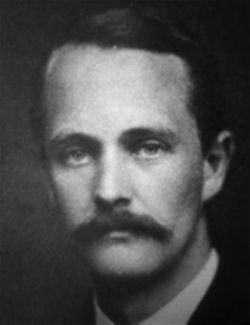The Text of this mutilated ballad is taken from the Skene MS., where it was written down from recitation in the North of Scotland about 1802.
The Story is of a double transformation of a sister and brother by a stepmother. Compare the story of The Marriage of Sir Gawaine (First Series, p. 108). Allison Gross should be compared closely with this ballad. The combing of hair seems to be a favourite method of expressing affection, not only in these ballads, but also in Scandinavian folklore. It is needless to take exception to the attribution either of hair to a worm, or of knees to a machrel: though we may note that in one version of Dives and Lazarus Dives 'has a place prepared in hell to sit on a serpent's knee.' However, it is probable that a part of the ballad, now lost, stated that the machrel (whatever it may be) reassumed human shape 'every Saturday at noon.'
THE LAILY WORM AND THE MACHREL OF THE SEA
1.
'I was but seven year auld
When my mither she did die;
My father married the ae warst woman
The warld did ever see.
2.
'For she has made me the laily worm,
That lies at the fit o' the tree,
An' my sister Masery she's made
The machrel of the sea.
3.
'An' every Saturday at noon
The machrel comes to me,
An' she takes my laily head
An' lays it on her knee,
She kaims it wi' a siller kaim,
An' washes 't in the sea.
4.
'Seven knights hae I slain,
Sin I lay at the fit of the tree,
An' ye war na my ain father,
The eight ane ye should be.'
5.
'Sing on your song, ye laily worm,
That ye did sing to me:'
'I never sung that song but what
I would sing it to thee.
6.
'I was but seven year auld,
When my mither she did die;
My father married the ae warst woman
The warld did ever see.
7.
'For she changed me to the laily worm,
That lies at the fit o' the tree,
And my sister Masery
To the machrel of the sea.
8.
'And every Saturday at noon
The machrel comes to me,
An' she takes my laily head
An' lays it on her knee,
An' kames it wi' a siller kame,
An' washes it i' the sea.
9.
'Seven knights hae I slain
Sin I lay at the fit o' the tree;
An' ye war na my ain father,
The eighth ane ye shoud be.'
10.
He sent for his lady,
As fast as send could he:
'Whar is my son that ye sent frae me,
And my daughter, Lady Masery?'
11.
'Your son is at our king's court,
Serving for meat an' fee,
An' your daughter's at our queen's court,
... ... ...'
12.
'Ye lie, ye ill woman,
Sae loud as I hear ye lie;
My son's the laily worm,
That lies at the fit o' the tree,
And my daughter, Lady Masery,
Is the machrel of the sea!'
13.
She has tane a siller wan',
An' gi'en him strokes three,
And he has started up the bravest knight
That ever your eyes did see.
14.
She has ta'en a small horn,
An' loud an' shrill blew she,
An' a' the fish came her untill
But the proud machrel of the sea:
'Ye shapeit me ance an unseemly shape,
An' ye's never mare shape me.'
15.
He has sent to the wood
For whins and for hawthorn,
An' he has ta'en that gay lady,
An' there he did her burn.
The Laily Worm And The Machrel Of The Sea
Frank Sidgwick
Suggested Poems
Explore a curated selection of verses that share themes, styles, and emotional resonance with the poem you've just read.
